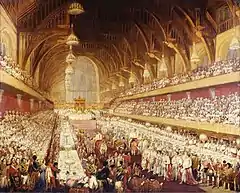1821 in the United Kingdom
Events from the year 1821 in the United Kingdom. This is a census year.
Other years |
| 1820 | 1821 | 1822 | 1823 |
Sport |
Incumbents
- Monarch – George IV
- Prime Minister – Robert Jenkinson, 2nd Earl of Liverpool (Tory)
- Parliament – 7th
Events

The coronation banquet for George IV
- 16 January – the Tories under Robert Jenkinson, 2nd Earl of Liverpool win the general election which had begun in 1820.
- 2 February – Cinderloo Uprising: Shropshire Yeomanry fire on a crowd of miners striking over a pay cut in the Coalbrookdale Coalfield, killing three.[1]
- 18 February – launch of the New Observer newspaper, later to become The Sunday Times.[2]
- April/May – John Constable completes his painting The Hay Wain.[3]
- 5 May – The Guardian newspaper founded as The Manchester Guardian.[2]
- 7 May – Bank of England returns to the gold standard.[4]
- 28 May – the national census is the first to measure age distribution and reveals that almost half of the population is under twenty years old.[5] Over the preceding decade in England and Wales the population has increased by 18%.
- 4 July – redesigned Haymarket Theatre opens in London.[4]
- 19 July – George IV is crowned king of the United Kingdom of Great Britain and Ireland.[6] His estranged wife, Caroline of Brunswick, is turned away from the coronation ceremony. This is the last coronation at which the full ceremony of the King's Champion is carried out, and at which dillegrout is served.
- 31 July – opening of the Eau Brink Cut, improving the outfall of the River Great Ouse at King's Lynn in Norfolk. Engineers working on the project included John Rennie the Elder, Thomas Telford and Thomas Hyde Page.[7]
- undated – Elizabeth Fry and others establish the British Ladies' Society for Promoting the Reformation of Female Prisoners, an early example of a national women's organisation.
Publications
- Thomas De Quincey's autobiographical Confessions of an English Opium-Eater (anonymously in The London Magazine).
- Walter Scott's novel Kenilworth.
- Percy Bysshe Shelley's elegy Adonais.
Births
- 2 January – Catherine Huggins, actor, singer, director and manager (died 1887)
- 3 February – Elizabeth Blackwell, physician, abolitionist and women's rights activist (died 1910)
- 17 February – Lola Montez, born Eliza Rosanna Gilbert, Irish-born "Spanish dancer" and mistress of Ludwig I of Bavaria (died 1861 in the United States)
- 8 March – James Sheridan Muspratt, Irish-born research chemist and teacher (died 1871)
- 15 March – William Milligan, Scottish theologian (died 1893)
- 19 March – Richard Francis Burton, explorer, orientalist and translator (died 1890)
- 25 March – Isabella Banks, poet and novelist (died 1897)
- 28 March – William Howard Russell, Irish-born war correspondent (died 1907)
- 3 April – T. Pelham Dale, mystic (died 1892)
- 12 April – Beauchamp Seymour, admiral (died 1895)
- 16 April – Ford Madox Brown, painter (died 1893)
- 21 April – Philip Henry Delamotte, pioneer photographer (died 1889)
- 26 April – Robert Adamson, Scottish pioneer photographer (died 1848)
- 27 April – Henry Willis, organ builder (died 1901)
- 29 May – Frederick Locker-Lampson, man of letters (died 1895)
- 16 June – Old Tom Morris, Scottish golfer (died 1908)
- 30 June – William Hepworth Dixon, historian, traveller and journal editor (died 1879)
- 9 July
- George Cavendish-Bentinck, Conservative politician (died 1891)
- Adolphus Frederick Alexander Woodford, freemason and clergyman (died 1887)
- 16 August – Arthur Cayley, mathematician (died 1895)
- 28 August – Thomas Seddon, landscape painter (died 1856 in Egypt)
- 11 October – George Williams, founder of the YMCA (died 1905)
- 30 November – Frederick Temple, Archbishop of Canterbury (died 1902)
- 11 December – George Granville Bradley, Dean of Westminster and scholar (died 1903)
Deaths
- 23 February – John Keats, poet, of tuberculosis in Rome (born 1795)
- 4 March – Princess Elizabeth of Clarence, daughter of William, Duke of Clarence (later King William IV) (born 1820)
- 2 May – Hester Thrale, diarist and patron of the arts (born 1741?)
- 15 June – John Ballantyne, Scottish publisher (born 1774)
- 4 July – Richard Cosway, portrait painter (born 1742)
- 7 August – Caroline of Brunswick, queen consort of King George IV (born 1768)
- 1 August – Elizabeth Inchbald, novelist and dramatist (born 1753)
- 24 August – John William Polidori, physician and writer, suicide (born 1795)
- 4 October – John Rennie the Elder, civil engineer (born 1761)
- November – Alexander Gordon, distiller (born 1742)
- 17 November – James Burney, rear-admiral and naval writer (born 1750)
- 4 December – John Henniker-Major, 2nd Baron Henniker, politician (born 1752)
- 12 December – Phoebe Hessel, female soldier (born 1713)
References
- "About Cinderloo". Cinderloo Remembered. Retrieved 9 August 2019.
- "Concise History of the British Newspaper in the Nineteenth Century". Archived from the original on 24 February 2008. Retrieved 17 March 2008.
- "Icons, a portrait of England 1820–1840". Archived from the original on 22 September 2007. Retrieved 12 September 2007.
- Palmer, Alan; Veronica (1992). The Chronology of British History. London: Century Ltd. pp. 251–252. ISBN 0-7126-5616-2.
- "1821". 2011 Census. 2011. Archived from the original on 18 July 2011. Retrieved 13 February 2011.
- Penguin Pocket On This Day. Penguin Reference Library. 2006. ISBN 0-14-102715-0.
- Hills, Richard L. (1967). Machines, Mills and uncountable costly necessities: a short history of the drainage of the Fens. Norwich: Goose & Sons.
Further reading
- New Annual Register...for 1821, London: Longman, 1822
External links
This article is issued from Wikipedia. The text is licensed under Creative Commons - Attribution - Sharealike. Additional terms may apply for the media files.